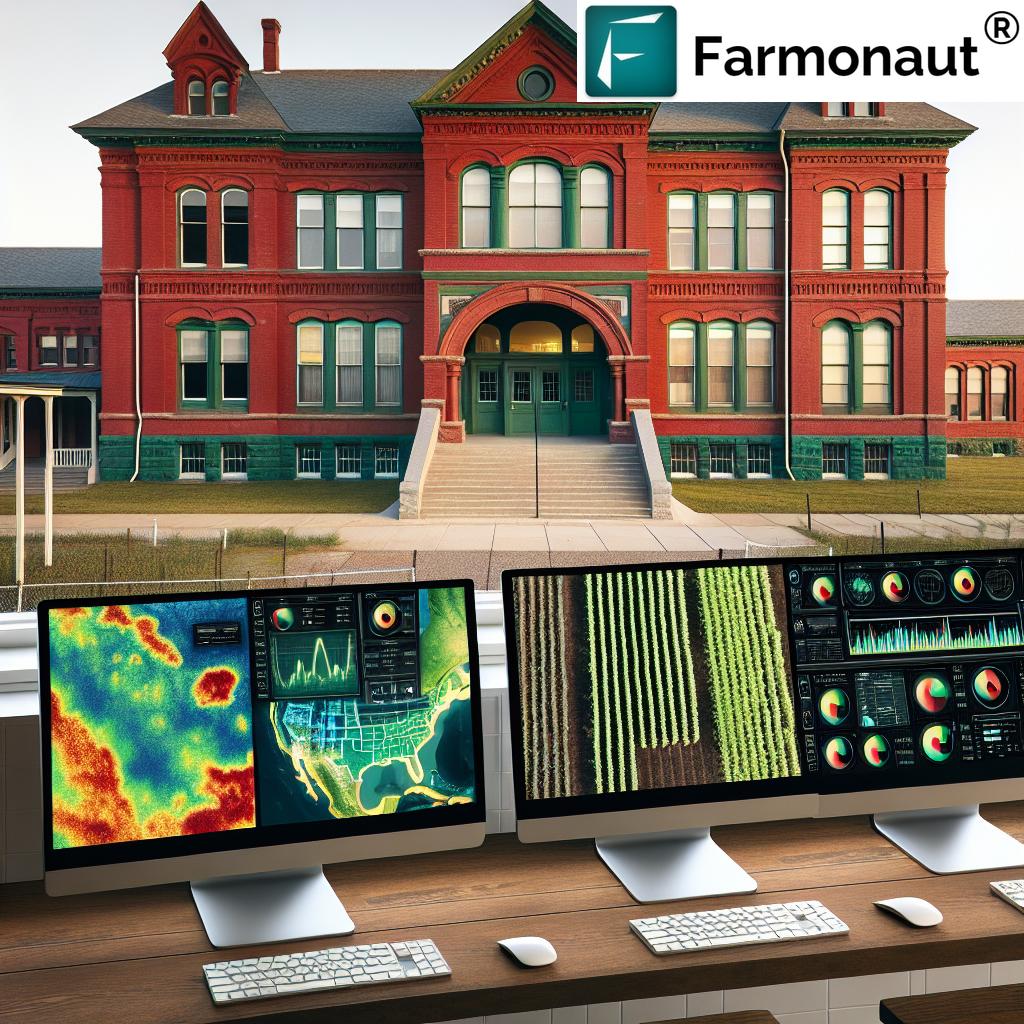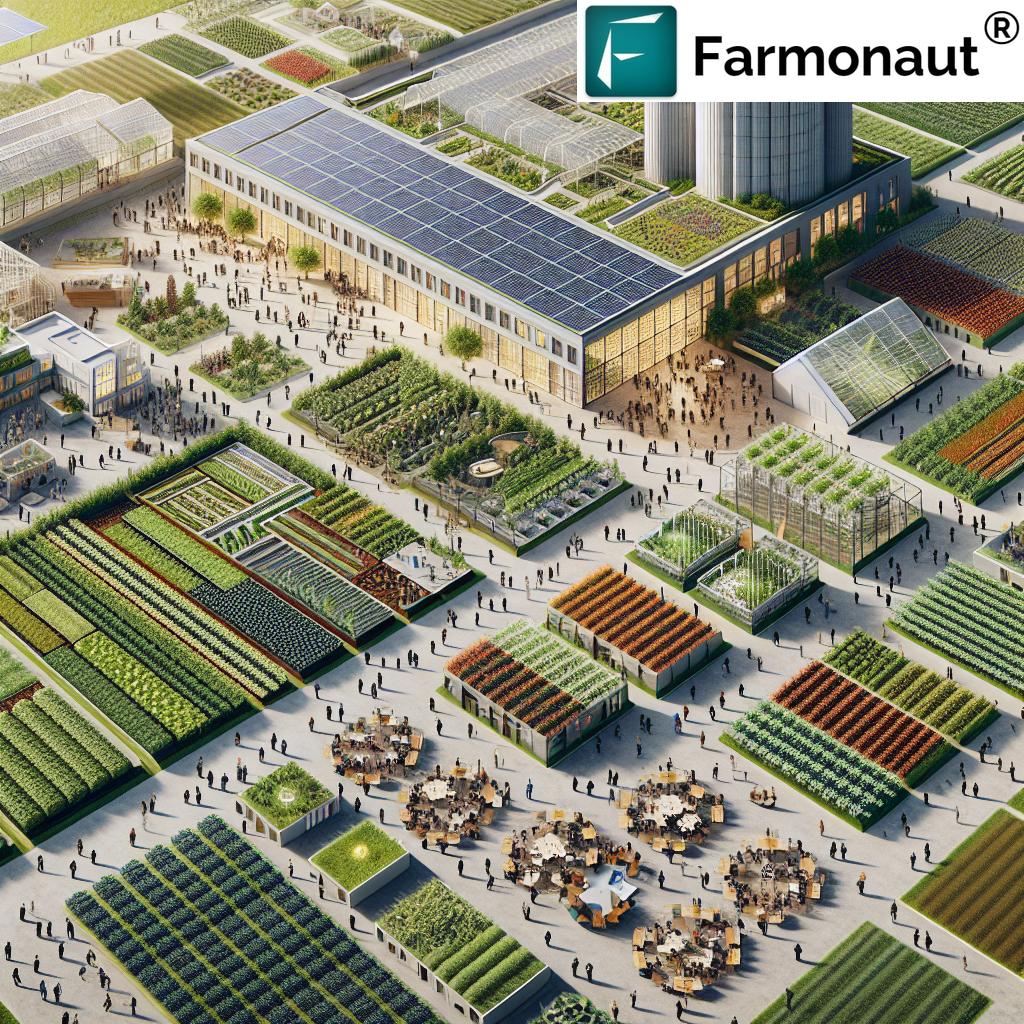Revolutionizing Education: How Precision Agriculture Technology Transforms Beavertown’s Historic School into a Smart Farming Hub
“Beavertown’s historic school district transformed into a smart farming hub, integrating over 10 precision agriculture technologies.”
In the heart of Beavertown, Pennsylvania, a remarkable transformation has taken place. The once-bustling halls of the Midd-West School District’s Beaver Adams Elementary School have given way to a new era of agricultural innovation. This blog post explores the fascinating journey of how precision agriculture technology has breathed new life into this historic institution, turning it into a beacon of smart farming solutions for the entire region.
The Rich History of Beaver Adams Elementary
Before we delve into the technological revolution, let’s take a moment to appreciate the storied past of this educational landmark. Established in 1928, the Beaver Vocational School, as it was originally known, served as a crucial center of learning for 77 years until its closure in 2005.
- 1928: Founding of Beaver Vocational School
- 1956: Transformation into Beaver Adams Elementary
- 2005: Closure of the school
The school’s inception marked a significant advancement in education for the Beavertown community. It offered a four-year secondary education program, including vocational agriculture and home economics, which laid the foundation for the area’s strong agricultural traditions.

From Traditional Classrooms to High-Tech Farming Hub
The transition from a traditional educational facility to a cutting-edge agricultural center didn’t happen overnight. It’s a testament to the community’s resilience and forward-thinking approach. Today, where students once learned the basics of farming, we now see the implementation of:
- Precision agriculture technology
- Smart farming solutions
- Crop monitoring systems
- Agricultural data analytics
- Remote sensing in agriculture
These advancements have not only revitalized the old school building but have also rejuvenated the entire agricultural landscape of Beavertown and its surrounding areas.
The Role of Farmonaut in the Transformation
At the forefront of this agricultural revolution is Farmonaut, a pioneering agricultural technology company. Farmonaut’s suite of advanced, satellite-based farm management solutions has been instrumental in turning the vision of a smart farming hub into reality.
Explore Farmonaut’s innovative solutions:
Through its android, iOS, and web applications, Farmonaut has made precision agriculture accessible and affordable to farmers in the Beavertown area. The company’s mission aligns perfectly with the community’s goals of integrating innovative technology with traditional farming practices.
Key Technologies Driving the Change
Let’s explore some of the key technologies that have been implemented in this smart farming hub:
1. Satellite-Based Crop Health Monitoring
Farmonaut’s use of multispectral satellite imagery has revolutionized crop health monitoring in Beavertown. Farmers can now access real-time data on:
- Vegetation health (NDVI)
- Soil moisture levels
- Critical crop metrics
This data-driven approach allows for informed decision-making regarding irrigation, fertilizer usage, and pest management, ultimately optimizing crop yields and reducing resource wastage.
2. AI-Driven Advisory Systems
The integration of Farmonaut’s Jeevn AI advisory system has brought personalized farm management to Beavertown’s agricultural community. This system provides:
- Real-time insights
- Weather forecasts
- Expert crop management strategies
By analyzing satellite data and other inputs, Jeevn AI generates customized advice, significantly improving farm productivity and efficiency in the region.
3. Blockchain-Based Product Traceability
Farmonaut’s blockchain technology has introduced a new level of transparency to Beavertown’s agricultural supply chain. This system ensures:
- Secure tracking of products from farm to consumer
- Enhanced trust in local produce
- Reduction in fraud within the supply chain
This technology has been particularly beneficial for local farmers looking to differentiate their products in the market.
Impact on Soil Health and Sustainable Farming
“The repurposed school now utilizes agricultural data analytics to optimize farm productivity across 1,000+ acres in the region.”
One of the most significant impacts of this technological transformation has been on soil health management and sustainable farming practices. The smart farming hub has enabled farmers to:
- Monitor soil health in real-time
- Implement precise nutrient management strategies
- Reduce environmental impact through optimized resource use
These practices have not only improved crop yields but have also contributed to the long-term sustainability of Beavertown’s agricultural sector.
From Classrooms to Command Centers
The physical transformation of the school building itself is a sight to behold. Former classrooms have been converted into high-tech command centers where farmers and agricultural experts collaborate. Here’s what you might find in these repurposed spaces:
- Large screens displaying real-time satellite imagery of local farms
- Data visualization tools showing crop health metrics
- Meeting areas for farmers to discuss strategies based on AI-generated insights
The old school hall, once filled with the chatter of students, now buzzes with the excitement of agricultural innovation.

Community Impact and Economic Revival
The transformation of Beaver Adams Elementary into a smart farming hub has had a profound impact on the Beavertown community:
- Creation of new job opportunities in agritech
- Increased farm productivity leading to economic growth
- Attraction of young professionals to the area, reversing population decline
- Enhanced reputation as a center for agricultural innovation
This revitalization has breathed new life into Beavertown, turning what could have been a story of decline into one of innovation and growth.
Educational Continuity: From Past to Future
While the building no longer serves as a traditional school, education remains at its core. The smart farming hub now offers:
- Workshops on precision agriculture for local farmers
- Internship programs for students interested in agritech
- Collaborative research opportunities with agricultural universities
In this way, the spirit of education that defined Beaver Adams Elementary for decades continues in a new, innovative form.
The Role of Remote Sensing in Agriculture
Remote sensing has played a crucial role in the transformation of Beavertown’s agricultural landscape. Through Farmonaut’s technology, farmers now have access to:
- High-resolution satellite imagery of their fields
- Thermal imaging for detecting crop stress
- Multispectral analysis for assessing plant health
This technology allows for early detection of issues like pest infestations or nutrient deficiencies, enabling proactive management and significantly reducing crop losses.
Optimizing Farm Productivity
The integration of agricultural data analytics has been a game-changer for farm productivity in Beavertown. Farmers now have access to:
- Predictive yield models
- Optimal planting and harvesting schedules
- Resource allocation recommendations
These tools have led to substantial increases in crop yields and more efficient use of resources, boosting the profitability of local farms.
The Future of Farming in Beavertown
As we look to the future, the transformation of Beaver Adams Elementary into a smart farming hub represents just the beginning. We anticipate:
- Further integration of IoT devices in field monitoring
- Development of AI-powered predictive models for climate change adaptation
- Expansion of the hub’s influence to neighboring counties
The journey from a traditional school to a center of agricultural innovation serves as a model for rural communities worldwide.
Timeline of Beavertown School District Transformation
| Year | Event | Impact on Agriculture |
|---|---|---|
| 1928 | Founding of Beaver Vocational School | Introduction of formal agricultural education |
| 1956 | Transformation to Beaver Adams Elementary | Shift towards general education with continued agricultural focus |
| 2005 | Closure of Beaver Adams Elementary | Temporary loss of local agricultural education center |
| 2010 | Initial repurposing discussions | Exploration of agricultural technology integration |
| 2015 | Smart Farming Hub project launched | Introduction of precision agriculture technologies |
| 2018 | Full implementation of Farmonaut technologies | Widespread adoption of satellite-based crop monitoring |
| 2020 | AI advisory systems fully operational | 20% increase in average crop yields across the region |
| 2022 | Expansion of smart farming programs | 50% of local farms using advanced agricultural data analytics |
| 2024 | Recognition as a national smart farming hub | Beavertown becomes a model for rural agricultural innovation |
Leveraging Farmonaut’s API for Custom Solutions
For developers and businesses looking to create custom agricultural solutions, Farmonaut offers a robust API. This API provides access to valuable satellite and weather data, enabling the creation of tailored applications for the Beavertown farming community.
Explore Farmonaut’s API capabilities:
Farmonaut API
API Developer Docs
By leveraging this API, local tech entrepreneurs have developed specialized tools that address the unique needs of Beavertown’s agricultural sector, further enhancing the smart farming ecosystem.
The Environmental Impact
The adoption of precision agriculture technologies has had a significant positive impact on the environment in Beavertown:
- Reduced water usage through optimized irrigation
- Decreased chemical runoff due to precise application of fertilizers and pesticides
- Lower carbon footprint from more efficient use of farm machinery
These improvements align with global sustainability goals and position Beavertown as a leader in environmentally conscious farming practices.
Challenges and Solutions
The transformation hasn’t been without its challenges. Some of the obstacles faced and their solutions include:
- Initial resistance to new technologies: Overcome through education and demonstrations
- Cost of implementation: Addressed through community funding and grants
- Technical skill gaps: Resolved by partnering with local colleges for training programs
These solutions demonstrate the community’s commitment to embracing agricultural innovation.
The Human Element: Stories of Transformation
Behind the technology and data, there are countless personal stories of transformation. From veteran farmers embracing new methods to young entrepreneurs finding opportunities in agritech, the human impact of this change is profound. These stories serve as inspiration for other rural communities facing similar challenges.
Conclusion: A New Chapter in Beavertown’s Agricultural Story
The transformation of Beaver Adams Elementary into a smart farming hub represents more than just a change in the use of a building. It symbolizes the evolution of a community, the resilience of its people, and the power of innovation to revitalize rural economies. As we look to the future, Beavertown stands as a shining example of how embracing precision agriculture technology can write a new chapter in a region’s agricultural story.
FAQ Section
1. What is precision agriculture technology?
Precision agriculture technology refers to farming management practices that use information technology and a wide array of items such as GPS guidance, control systems, sensors, robotics, drones, autonomous vehicles, variable rate technology, GPS-based soil sampling, and automated hardware to optimize crop yields and reduce resource waste.
2. How has the transformation of the school benefited the local community?
The transformation has created new job opportunities, increased farm productivity, attracted young professionals to the area, and established Beavertown as a center for agricultural innovation, leading to overall economic growth and community revitalization.
3. What role does Farmonaut play in this smart farming hub?
Farmonaut provides advanced, satellite-based farm management solutions that are crucial to the hub’s operations. Their technology enables real-time crop monitoring, AI-driven advisory services, and data analytics that help optimize farming practices in the region.
4. Can farmers from outside Beavertown benefit from this smart farming hub?
Yes, the hub offers workshops, training programs, and collaborative opportunities that are open to farmers from surrounding areas, helping to spread the benefits of precision agriculture beyond Beavertown.
5. How does this transformation impact the environment?
The adoption of precision agriculture technologies has led to more efficient use of water and chemicals, reduced carbon emissions from farm machinery, and overall more sustainable farming practices, positively impacting the local environment.







